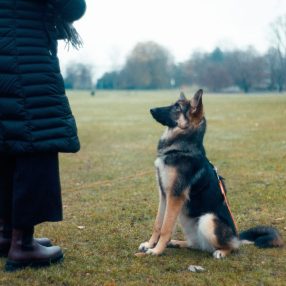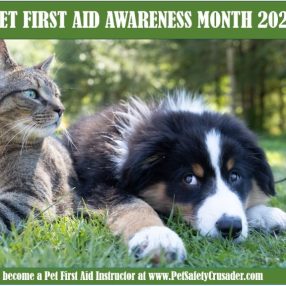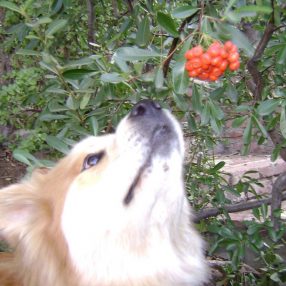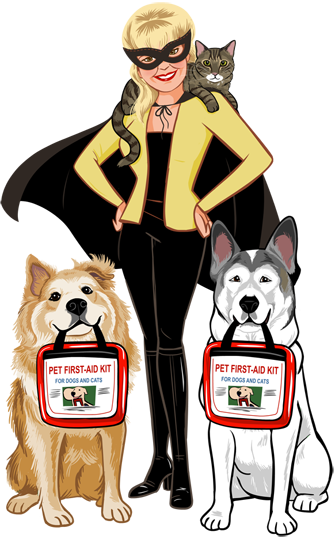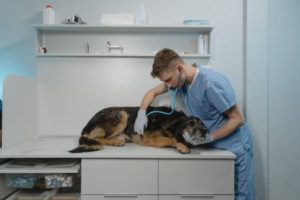
Flipping through The Pet Safety Bible, I found 115 references that include upset stomach, vomiting, regurgitation or diarrhea as a symptom or side effect of vaccinations, distemper, leptospirosis, parvovirus, panleukopenia, feline urological syndrome, FeLV (Feline Leukemia), giardia, insect repellent and sunscreen, chocolate toxicity, ingestion of plants, vestibular disease, insect/arachnid stings, fur balls, heatstroke, diabetes, hyponatremia – the list goes on. This means, only your veterinarian may know for sure the cause as to why a pet in your care is experiencing any form of gastrointestinal upset. Consult your client, the pet’s parent, as they may offer a clue, but any time blood is present in vomit or diarrhea, collect a sample, snap a photo with your phone, and get the pet checked out at once!
Although an upset tummy (including vomiting and diarrhea) is a common sign of poisoning and illness, most often it is caused by a simple digestive upset — the pet ate too much, too fast or something he should not have. Scavenging trash, ingesting moldy food or rotten apples, could be the cause.
Vomiting
“An isolated episode of vomiting may be normal, but 2-3 episodes in a 24-hour period is not and warrants medical attention,” explains Julie Reck, DVM, Veterinary Medical Center of Fort Mill, South Carolina and Co-Founder of Aspire Vet, “If the pet has any other symptoms, such as lethargy or lack of appetite, then even an isolated episode should be evaluated by your veterinarian.”
Dr. Julie Buzby, DVM, CVA, CAVCA, Founder of Dr. Buzby’s Innovations, agrees and takes vomiting more seriously than diarrhea. “Vomiting — unless it’s a once and done episode in a happy, active pet – means a vet visit!” she says. “There are too many rule outs for vomiting that require timely medical or surgical intervention. After a physical exam, perhaps the vet will deem that tests are necessary (i.e. bloodwork, x-rays) or maybe he or she will recommend the conservative course of diet change and home monitoring.” Either way, this can be a win-win for a professional pet sitter. If the pet is sick enough to be hospitalized, good for you for recognizing it and taking the pet in for care! If it turns out treatment wasn’t needed, both you and the pet owner have peace of mind and home care instructions.
Regurgitation
Knowing the difference between vomiting and regurgitation can help the veterinarian evaluate the situation. Vomiting occurs when food or liquid, is expelled from a pet’s stomach or upper small intestine and is generally preceded by audible retching. If it originated in the stomach, it may include clear liquid, while yellow or green fluid implies it came from the small intestine. Of course, undigested or partially digested food may also come up.
Regurgitation differs in that the expelled material almost always comes from the esophagus (the muscular tube that propels water, food and saliva down into the stomach). When a pet regurgitates, he brings up water, saliva and undigested food silently, and the suddenness of it, takes you both by surprise. Since it occurs quickly, the larynx (opening to the windpipe) often doesn’t have time to close and some of the regurgitated matter may be inhaled into the lungs resulting in aspiration pneumonia. Should you suspect this, get right to the vet!
Diarrhea
“Recently, I read of a 5-year old ‘healthy’ dog who had a couple bouts with diarrhea,” shared Dr. Buzby. “The owner wasn’t too concerned given the dog was otherwise acting fine. A couple days later, the owner came home to find the dog deceased! Addison’s disease can present like this – diarrhea and then acute collapse.”
Frequent loose or runny bowel movements can come on quickly and last a brief period of time. Ongoing episodes of diarrhea however, can lead to dehydration and may indicate an underlying health concern. Know the animal’s habits. Check litter boxes frequently and monitor dogs, on walks or in fenced yards, to stay on top of their health.
What’s a Pet Parent to Do?
- Get down on all fours checking the house and yard for items pets might get into or absorb through paws before you leave a sit. With cats and counter-surfing dogs, you must also examine higher spots for hazards.
- Prevent pets from drinking out of lakes, streams, gutters, buckets and unsanitary sources. Wash water bowls daily with hot water and soap, rinsing thoroughly.
- Don’t feed table scraps (fat, grease, salts or rich foods) or change a pet’s diet suddenly.
- Ensure pets eat slowly by using specially designed bowls, provide smaller amounts more frequently or feed from toys in which they have to work for their food.
- Encourage clients to get regular check-ups making sure pet’s titers are high or vaccines are current, lowering risks of disease.
Keep an eye out for:
- Vomit or loose or frequent stools, especially if containing blood or mucus
- Out-of-character flatulence
- Straining or urgent need “to go”
- Weight loss
- Dehydration
- Fever
- Lethargy
If a seemingly healthy animal in your care experiences vomiting and/or diarrhea, and you know it is not the result of poisoning, err on the side of caution — call the client and seek treatment, taking a vomit or fecal sample along. It will give you both peace of mind and could save the day!
If confident just a digestive upset, withhold food for 24 hours but encourage drinking to prevent dehydration. Unsweetened Pedialyte® (diluted 50/50 with water) can be used use as needed to replace minerals lost due to diarrhea or vomiting. DIY recipe: 4 cups water, 1 Tablespoon sugar and 1 teaspoon salt (can be frozen into ice cubes and stored in the freezer).
Prescription Cerenia® is often best to alleviate vomiting in cats. Got dogs? Avoid Pepto-Bismol® and any products containing salicylic acid which can inflame the stomach, but your vet may suggest Mylanta® or Gaviscon® (except for pets with kidney disease). Dose is 15 – 45 ml/per kg of pet’s weight, so … if 5ml = 1 teaspoon and 1lbs. = 2.2 kg and you have 64 mg/ml strength of Gaviscon®, a 45 lbs. dog would get 1 – 3 teaspoons.
Both Veterinarians Reck and Buzby agree that oral probiotics may help without causing harm. Just be sure the brand you choose does not contain xylitol, a toxin deadly to dogs!
Once you have a diagnosis, pumpkin puree is a beneficial natural cure for diarrhea as the fiber helps firm up loose stools. Dose 1 tablespoon for small dogs and cats and up to 3 tablespoons for a large dog.
When sure it’s only a simple upset tummy, ginger snap cookies, the human kind, are usually easy to feed, but be mindful of sugar. Two cookies for a medium-sized dog generally does the trick. Prefer pure ginger capsules? 100 mg for every 25 lbs. the pet weighs repeated every 6-8 hours, or if Fido or Fluffy will drink, peel fresh ginger root, make 5 to 8 ¼” thick slices and boil in ¼ cup water. When it cools, let pet lap it up. Any of these ginger tips may also work if administered 20-30 minutes before a road trip to keep motion sickness at bay.
Dogs, and their feline siblings, sometimes get into things they should not, but upset stomachs, vomiting, regurgitation and diarrhea, can also be the signs of serious illness. When in doubt, always get a proper diagnosis to ensure a long, healthy lifetime ahead.


